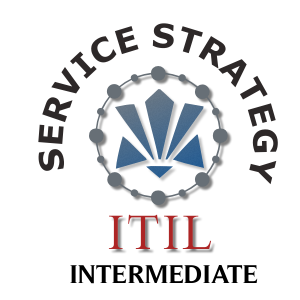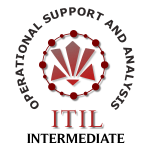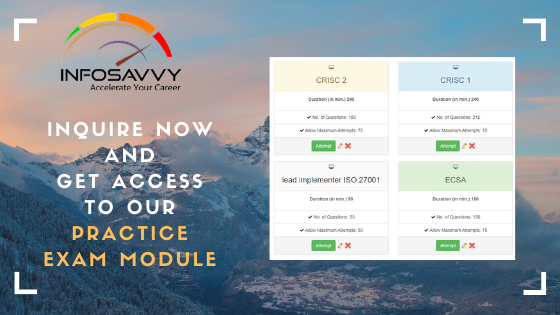The ITIL Intermediate Qualification: Service Strategy Certificate is a free-standing qualification but is also part of the ITIL intermediate lifecycle stream, and one of the modules that leads to the ITIL Expert Certificate in IT Service Management. The purpose of this training module and the associated exam and certificate is, respectively, to impart, test, and validate the knowledge on industry practices in service management and strategy as documented in the ITIL Service Strategy publication.
ITIL Intermediate Service Strategy
₹27,000.00 Original price was: ₹27,000.00.₹25,000.00Current price is: ₹25,000.00.
- Introduction to service strategy
- Full understanding of service strategy terms and core concepts.
- The purpose, goals and objectives of service strategy
- The scope of service strategy
- The value to the business
- The context of service strategy in relation to all other lifecycle stages.
- Full understanding of service strategy terms and core concepts.
- Service strategy principles
- The knowledge, interpretation and analysis of service strategy principles, techniques and relationships and their application for creation of effective service strategies.
- The ability to decide on a service strategy
- How to utilize the four P’s of service strategy
- How to define services, create value and leverage the combined use of utility and warranty
- How to use service economics and sourcing strategies when meeting business outcomes.
- The knowledge, interpretation and analysis of service strategy principles, techniques and relationships and their application for creation of effective service strategies.
- Service strategy processes
- The knowledge, interpretation and analysis of service strategy principles, techniques and relationships and their application for creation of effective service strategies.
- The management level concepts for the five service strategy processes and how they flow and integrate with the lifecycle
- The purpose, scope and objectives of each service strategy process and how they link to value for the business.
- The knowledge, interpretation and analysis of service strategy principles, techniques and relationships and their application for creation of effective service strategies.
- Governance
- The knowledge, interpretation and analysis of service strategy principles, techniques and relationships and their application for creation of effective service strategies.
- The ability to analyse IT governance and use it to set strategy by leveraging governance frameworks, bodies.
- The knowledge, interpretation and analysis of service strategy principles, techniques and relationships and their application for creation of effective service strategies.
- Organizing for service strategy
- The knowledge, interpretation and analysis of service strategy principles, techniques and relationships and their application for creation of effective service strategies.
- The ability to create an organizational design using the relevant development and departmental methods.
- The knowledge, interpretation and analysis of service strategy principles, techniques and relationships and their application for creation of effective service strategies.
- Technology considerations
- The knowledge, interpretation and analysis of service strategy principles, techniques and relationships and their application for creation of effective service strategies.
- Understand the relevance and opportunities for service automation and the importance and application of technology interfaces across the lifecycle.
- The knowledge, interpretation and analysis of service strategy principles, techniques and relationships and their application for creation of effective service strategies.
- Implementing service strategy
- The knowledge, interpretation and analysis of service strategy principles, techniques and relationships and their application for creation of effective service strategies.
- Develop implementation strategies that follow a lifecycle approach (e.g. design, transition,operation and improvement, programmes).
- The knowledge, interpretation and analysis of service strategy principles, techniques and relationships and their application for creation of effective service strategies.
- Challenges, critical success factors and risks
- The knowledge, interpretation and analysis of service strategy principles, techniques and relationships and their application for creation of effective service strategies.
- The ability to provide insight and guidance for strategic challenges, risks and critical success factors.
- The knowledge, interpretation and analysis of service strategy principles, techniques and relationships and their application for creation of effective service strategies.
• Chief information officers (CIOs)
• Chief technology officers (CTOs)
• Managers
• Supervisory staff
• Team leaders
• Service designers
• IT architects
• IT planners
• IT consultants
• IT audit managers
• IT security managers
Prerequisite Entry Criteria
Candidates wishing to be trained and examined for this qualification must already hold the ITIL Foundation Certificate in IT Service Management which must be presented as documentary evidence to gain admission Candidates who hold the following ITIL qualifications are also eligible, and similar evidence will be required:
• Earlier ITIL (V2) Foundation plus Foundation Bridge
• ITIL Expert Certificate in IT Service Management (achieved via Service Manager or Practitioner bridging routes).
Eligibility for Examination
To be eligible for the ITIL Intermediate Qualification: Service Strategy examination, candidates must have fulfilled the following requirements:
• At least 21 contact hours (hours of instruction, excluding breaks, with an Accredited Training Organization (ATO) or an accredited e-learning solution) for this syllabus, as part of a formal, approved training course/scheme
• A basic IT literacy and around 2 years IT experience are highly desirable
• Hold the ITIL Foundation Certificate in IT Service Management
• It is also recommended that candidates should complete at least 21 hours of personal study by reviewing the syllabus and the ITIL Service Strategy publication in preparation for the examination
Format of the Examination
- Type: Eight (8) multiple choice, scenario-based, gradient-scored questions.
Each question will have 4 possible answer options, one which is worth 5
marks, one which is worth 3 marks, one which is worth 1 mark, and one which
is a distracter and achieves no marks. - Duration Maximum 90 minutes for all candidates in their respective language
Provisions for Additional Time relating to language, Candidates completing an exam in a language that is not their mother tongue have a maximum of 120 minutes to complete the exam and are allowed the use of a dictionary. - Supervised Yes
- Open Book No
- Pass Score 28/40 or 70%
Overview
The ITIL Intermediate Service Strategy Certificate is a free-standing qualification but is also part of the ITIL Intermediate Services Strategy lifecycle stream, and one of the modules that leads to the ITIL Intermediate Service Strategy Expert Certificate in IT Service Management.
The purpose of this training module and the associated exam and certificate is, respectively, to impart, test, and validate the knowledge on industry practices in service management and strategy as documented in the ITIL Service Strategy publication.
Course Outline
- Introduction to service strategy
- Full understanding of service strategy terms and core concepts.
- The purpose, goals and objectives of service strategy
- The scope of service strategy
- The value to the business
- The context of service strategy in relation to all other lifecycle stages.
- Full understanding of service strategy terms and core concepts.
- Service strategy principles
- The knowledge, interpretation and analysis of service strategy principles, techniques and relationships and their application for creation of effective service strategies.
- The ability to decide on a service strategy
- How to utilize the four P’s of service strategy
- How to define services, create value and leverage the combined use of utility and warranty
- How to use service economics and sourcing strategies when meeting business outcomes.
- The knowledge, interpretation and analysis of service strategy principles, techniques and relationships and their application for creation of effective service strategies.
- Service strategy processes
- The knowledge, interpretation and analysis of service strategy principles, techniques and relationships and their application for creation of effective service strategies.
- The management level concepts for the five service strategy processes and how they flow and integrate with the lifecycle
- The purpose, scope and objectives of each service strategy process and how they link to value for the business.
- The knowledge, interpretation and analysis of service strategy principles, techniques and relationships and their application for creation of effective service strategies.
- Governance
- The knowledge, interpretation and analysis of service strategy principles, techniques and relationships and their application for creation of effective service strategies.
- The ability to analyse IT governance and use it to set strategy by leveraging governance frameworks, bodies.
- The knowledge, interpretation and analysis of service strategy principles, techniques and relationships and their application for creation of effective service strategies.
- Organizing for service strategy
- The knowledge, interpretation and analysis of service strategy principles, techniques and relationships and their application for creation of effective service strategies.
- The ability to create an organizational design using the relevant development and departmental methods.
- The knowledge, interpretation and analysis of service strategy principles, techniques and relationships and their application for creation of effective service strategies.
- Technology considerations
- The knowledge, interpretation and analysis of service strategy principles, techniques and relationships and their application for creation of effective service strategies.
- Understand the relevance and opportunities for service automation and the importance and application of technology interfaces across the lifecycle.
- The knowledge, interpretation and analysis of service strategy principles, techniques and relationships and their application for creation of effective service strategies.
- Implementing service strategy
- The knowledge, interpretation and analysis of service strategy principles, techniques and relationships and their application for creation of effective service strategies.
- Develop implementation strategies that follow a lifecycle approach (e.g. design, transition,operation and improvement, programmes).
- The knowledge, interpretation and analysis of service strategy principles, techniques and relationships and their application for creation of effective service strategies.
- Challenges, critical success factors and risks
- The knowledge, interpretation and analysis of service strategy principles, techniques and relationships and their application for creation of effective service strategies.
- The ability to provide insight and guidance for strategic challenges, risks and critical success factors.
- The knowledge, interpretation and analysis of service strategy principles, techniques and relationships and their application for creation of effective service strategies.
Who Should Attend
Chief information officers (CIOs)
• Chief technology officers (CTOs)
• Managers
• Supervisory staff
• Team leaders
• Service designers
• IT architects
• IT planners
• IT consultants
• IT audit managers
• IT security managers
ITIL Foundation https://www.info-savvy.com/product/itil-foundation/
ITIL Intermediate Continual Service Improvement https://www.info-savvy.com/product/itil-intermediate-continual-service-improvement/
You must be logged in to post a review.
Related products
-
IT Management
Prince2 Foundation and Practitioner
Rated 0 out of 5₹40,000.00Original price was: ₹40,000.00.₹38,000.00Current price is: ₹38,000.00. Add to cartGet In Touch

 PRINCE2 (an acronym for PRojects IN Controlled Environments) is a de facto process-based method for effective project management. The method is used for a wide variety and size of projects. Since its introduction, PRINCE has become widely used in both the public and private sectors and is now a “de facto” standard for project management within UK government and within both UK and international industry.
PRINCE2 (an acronym for PRojects IN Controlled Environments) is a de facto process-based method for effective project management. The method is used for a wide variety and size of projects. Since its introduction, PRINCE has become widely used in both the public and private sectors and is now a “de facto” standard for project management within UK government and within both UK and international industry.PRINCE2 is a process-driven project management method and it is based on seven principles (continued business justification, learn from experience, defined roles and responsibilities, manage by stages, manage by exception, focus on products and tailored to suit the project environment), seven themes (business case, organization, quality, plans, risk, change and progress) and seven processes. . This course prepares the participants to appear for the APMG PRINCE2® Foundation and Practitioner level project management certification and pass it successfully.
[ninja_form id=7] -
IT Management
ISO 27001 Lead Auditor Training And Certification ISMS
Rated 4.92 out of 5₹28,000.00Original price was: ₹28,000.00.₹25,000.00Current price is: ₹25,000.00. Add to cartA Lead Auditor is a position between Senior Auditor and Head of Division which makes sure and examines financial records. Ensuring that financial records are accurate and that taxes are paid properly and on time. They assess financial operations and work to help ensure that organizations run efficiently.
This course is guided by experienced Lead Auditors who have audited for almost Blue Chip clients. This program is important in becoming a registered Lead Auditor or Auditor. It provides you the skills which are required to assess the Information Security Management System of an organization.
This teaches you how to protect the information from a wide range of threats in order to ensure that the business is not breached in any way
[ninja_form id=7]
-
IT Management
COBIT5 2019 Foundation Training
Rated 3.00 out of 5₹20,000.00Original price was: ₹20,000.00.₹15,000.00Current price is: ₹15,000.00. Add to cartCOBIT is a framework for the enterprise governance and management of information and technology (I&T) that supports enterprise goal achievement.
The COBIT 2019 Foundation course is intended for current COBIT 5 certificate holders as well as those new to COBIT who are interested in achieving the latest foundation certificate.
In this course, delegates will be taught about the concepts, models and key definitions of COBIT framework and helps prepare learners to take the COBIT 2019 Foundation exam.[ninja_form id=7]
-
IT Management
ITIL Intermediate Operational Support and Analysis
Rated 0 out of 5₹27,000.00Original price was: ₹27,000.00.₹25,000.00Current price is: ₹25,000.00. Add to cart









Reviews
There are no reviews yet.